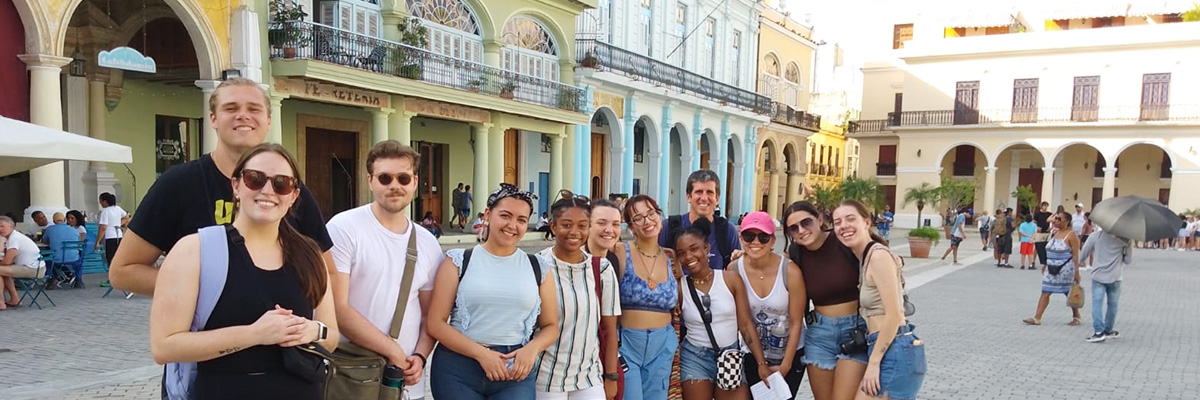La Habana Courses – 2026 January Session
Courses
You will enroll in three or four credits. At least one 3-credit course is required. Courses are intensive and typically meet three hours each day plus nightly homework assignments. Course availability is contingent on student enrollment and is subject to change.
Click the course title to view course details and description.
Cuban History, Society, Politics, and Latin American Culture Studies
The following courses focus on the culture and history of Cuba.
- January SessionPolitical Science 400-level 3 credits Taught in English
Governments and Politics in Latin America are connected to the colonial dependence and deformations in the social-economic, cultural, political, and ideological life. This course will address the core political issues facing the region. Students will be required to think critically about topics such as, authoritarianism, dictatorships, revolutions, social conflicts, political corruption, United States foreign policy, political and economic development, democratic transition, and indigenous and other minority group right, as it pertains to Latin America and the Caribbean.
- January Session400-level 3 credits Taught in English
This course will explore the socio-political systems and historical context of Cuba and the Caribbean from an anthropological perspective. The course will present contemporary theoretical perspectives that express the complex socio-economic, cultural, and political reality of the area, including topics of culture and "race," daily life, and religion within Cuba and the Caribbean as well other Latin American colonial societies. Students will draw upon the works and anthropological thinking of Fernando Ortiz, Jean Price-Mars, and C.L.R. James.
- January SessionSpanish 300-level 1 credit Taught in Spanish
A course that complements the development of linguistic skills emphasizing the oral mode of the Spanish language. It aims to improve students' ability to maintain a sustained monologue as well as oral interactions.
Prerequisite: Two semesters of college-level Spanish, or equivalent, or instructor approval
- January SessionCommunity Health Sciences Sociology 300-level 3 credits Taught in English
This course offers an overview of the Cuban health system that operates under the principle that health is an inalienable social right. These services are financed almost exclusively with government resources. The Ministry of Public Health is the governing body of the national health system, which manages resources in the three-tiered healthcare system. The primary tier solves approximately 80% of the population's health problems and its services are mainly provided in polyclinics and doctor's offices and family nurses. Approximately 15% of health problems are covered within the second tier. Its fundamental function is to treat pre-existing conditions to prevent complications and perform immediate rehabilitation. Approximately 5% of health problems are covered within the third tier. Treatments within this tier are related to sequelae or complications with certain diseases. This type of care is mainly provided in specialized hospitals or institutes.
The course will begin with an overview of basic concepts about the Cuban Public Health System. Students will be required to complete readings related to the different primary health care programs before the start of each class and participate in discussions based on the readings. The course will also require students to participate in practical activities that complement the course readings.
Note: The evaluation will be systematic based on oral questions, participation in classes and presentation of reports after practical activities.
To request a course syllabus: syllabus@usac.edu

